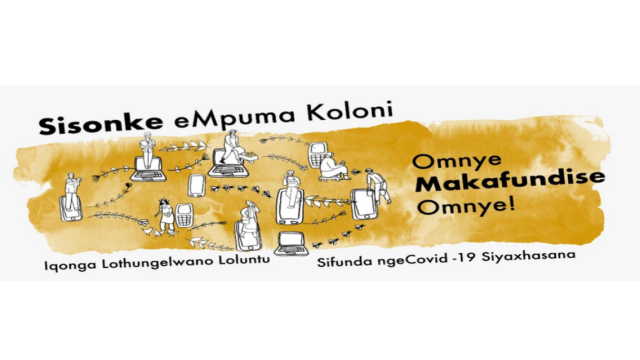
The Environmental Learning Research Centre (ELRC) at Rhodes University in collaboration with Imvotho Bubomi Learning Network (IBLN) and other local networks in the Eastern Cape has established the Eastern Cape Together Iqonga LoThungelwano.
This is a network of farmers, students, academics and activists with its focus on communication and social learning to respond to the COVID-19 pandemic with a strong focus on rural Eastern Cape.
The network has been active since late March, when a group of concerned people from the Imvotho Bubomi Learning Network (IBLN) identified the problem of a lack of good quality coronavirus awareness material that spoke to rural Eastern Cape citizens in their own language and with relevance to their own contexts.
Inspiring models such as the Cape Town Together Community Action Networks helped to spur this group to develop a similar initiative in the Eastern Cape.
The network now has over 200 community champions, from Humansdorp in the west to Bizana in the east and from Lady Frere to Port St John. It also reaches Thembalethu (George), into the Cape Flats communities and the amaXhosa communities in Gauteng.
The network aims to provide a space for the flow of information about the disease itself - how to slow the spread, best practices for mask making and wearing, hand hygiene, food preparation, caring for COVID-19 patients; but also about the social impacts of the lockdown – giving advice on how to access the new social grants, linking people to food relief initiatives, tracking and reporting villages with no access to water, following up on reports of local clinics turning people away, and so on.
The Eastern Cape Together Iqonga LoThungelwano sources materials from other initiatives including the excellent materials produced by the Rhodes University Community Engagement unit, and also produces original materials in isiXhosa. All written materials that the network develops and shares are thoroughly fact-checked, written in easily accessible English then translated into the isiXhosa spoken in the villages and townships, and accompanied by a voice note that gives some background and context for the information being shared.
The Eastern Cape Together Iqonga LoThungelwano team also produces short videos featuring champions and community members, explaining and demonstrating best practices relating to protecting ourselves and others from the virus, and sharing inspirational stories. These videos are all available on the Iqonga Lothungelwano YouTube channel: https://www.youtube.com/channel/UCbK41qVZpxwIOdnCi6gm8hw
The community champions are provided with monthly data bundles. They use this data to send all of these materials on into their own networks, which are diverse groups that include councillors, municipal officials, traditional leaders, health care workers, grandmothers, fisher folk, high school learners and more. Responses, questions and suggestions are sent back to the coordination team, and in this way, there is a two-way flow of information, which has been critical in this time of limited movement.
The World Health Organization has identified six criteria which need to be in place for the safe easing of lockdown. The sixth criteria is ‘engaged communities who understand messages and adopt sustainably safe procedures’.
ISSUED BY THE COMMUNICATIONS AND ADVANCEMENT DIVISION ON BEHALF OF RHODES UNIVERSITY
